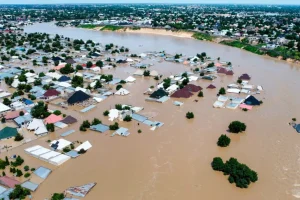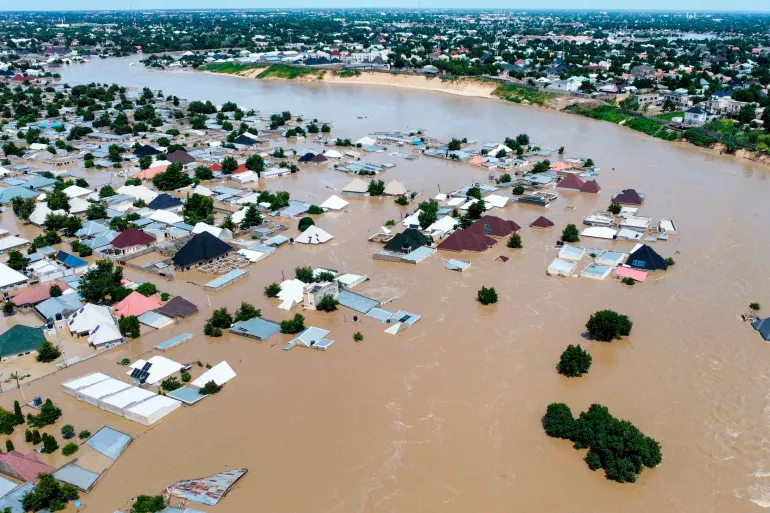
By Adeyemi Adekunle
As climate-induced disasters wreak havoc across Nigeria, the federal government has declared an ambitious commitment to nature-based solutions as a central strategy in tackling the country’s mounting environmental challenges. Nkiruka Maduekwe, the Special Presidential Envoy on Climate Change and Director-General of the National Council on Climate Change Secretariat (NCCCS), unveiled this initiative during a press briefing in Abuja last Friday.
Maduekwe emphasized that climate change is no longer a distant concern but a present and growing threat affecting millions of Nigerians. She called for immediate and innovative measures, noting that the country is located in one of the world’s hotspots for high human vulnerability to climate impacts. “Nigeria continues to experience adverse effects such as droughts, floods, desertification, and rising sea levels, which are jeopardizing lives, livelihoods, and economic progress,” she said.
Escalating Climate Challenges
In recent years, the effects of extreme weather events have become alarmingly frequent, leaving devastation in their wake. The impacts are most visible in the nation’s agricultural sector, where farmers are grappling with unpredictable rainfall patterns, prolonged droughts, and unprecedented flooding.
Over the past three years, heavy rainfall has triggered back-to-back floods that have inundated farmland and displaced entire communities. According to the National Emergency Management Agency (NEMA), floods killed 303 people in 2024 alone, affected over 1.2 million others, and destroyed over 106,000 hectares of farmland.
Maduekwe underscored that this crisis has compounded existing vulnerabilities in Nigeria, such as widespread poverty, displacement due to security challenges, and deteriorating public infrastructure. “These interconnected issues are worsening the conditions for millions of people, especially in rural areas, and creating a ripple effect across the economy,” she noted.
Agriculture Under Siege
The agriculture sector, which employs more than 70% of Nigeria’s workforce and contributes significantly to the economy, has been hit hardest by the effects of climate change. Farmers across states like Benue, Kebbi, and Niger have witnessed repeated crop failures, leading to food shortages and skyrocketing prices of staple items such as rice, maize, and yams.
These challenges have deepened food insecurity, with millions of households struggling to access sufficient and affordable food. “The rainfall patterns we used to rely on are gone,” said James Uka, a farmer in Niger State. “Last year, our crops barely survived the drought, and then the floods destroyed what we had left. It’s a cycle we can’t escape.”
The cascading effects extend beyond rural communities. Urban areas have felt the strain of soaring food prices and a growing influx of displaced persons fleeing the impacts of climate change. Humanitarian agencies have warned of increased malnutrition among children, especially in areas hit hardest by the disasters.
Nature-Based Solutions: A Path Forward
Against this grim backdrop, the government’s pivot to nature-based solutions offers a glimmer of hope. These strategies harness the power of natural ecosystems to mitigate climate risks and promote sustainability. They include restoring degraded wetlands to absorb floodwaters, afforestation programs to combat desertification, and conserving mangroves to shield coastal communities from rising sea levels.
According to Maduekwe, one flagship project for 2025 is the large-scale restoration of Nigeria’s wetland ecosystems. Wetlands act as natural sponges, absorbing excess rainwater and reducing flood risks. Over the next year, the government plans to rehabilitate wetland areas in flood-prone states, providing a buffer against recurring disasters.
Additionally, afforestation programs are being scaled up across northern Nigeria, where desertification threatens agricultural productivity and exacerbates rural poverty. “We must restore our forests and protect the ecosystems that sustain us,” Maduekwe said. “These actions are not just about the environment—they are about securing livelihoods and a future for our people.”
Leveraging Local and International Partnerships
Implementing these ambitious projects requires significant financial investment and technical expertise. The NCCCS is working with international organizations, including the United Nations Environment Programme (UNEP) and the Global Environment Facility (GEF), to secure funding and support for nature-based initiatives.
Domestically, the council is engaging local communities and stakeholders to ensure that projects are designed with their input and address their specific needs. “Communities are at the heart of our strategy,” said Maduekwe. “We recognize that solutions must be inclusive and participatory to succeed.”
Climate-Smart Agriculture: Building Resilience
Complementing nature-based solutions is the government’s renewed focus on climate-smart agriculture. This approach combines traditional knowledge with modern innovations to build resilience in the agricultural sector.
Key interventions include the promotion of drought-resistant crop varieties, improved irrigation systems that conserve water, and the use of early warning systems to help farmers anticipate and respond to changing weather patterns. Through partnerships with agricultural research institutes, the government is also investing in training programs to equip farmers with the skills needed to adapt to the new climate realities.
Broader Impacts
Beyond agriculture, the shift to nature-based solutions aims to address the broader socio-economic and environmental impacts of climate change. Restoring natural ecosystems could help protect Nigeria’s biodiversity, reduce carbon emissions, and create green jobs, contributing to the country’s long-term development goals.
However, experts warn that these efforts must be sustained and supported by strong governance. Transparent management of funds, effective monitoring, and accountability mechanisms will be critical to the success of these initiatives.
Maduekwe called for a united front to combat climate change, emphasizing that the crisis cannot be tackled in isolation. “Climate change is a global challenge that requires local solutions and collective action,” she said. “From government policies to individual actions, we all have a role to play in protecting our planet and our future.”
For communities like those in Benue State, the stakes could not be higher. “We can’t do this alone,” said Musa, a farmer whose land was washed away last year. “We need the government, NGOs, and everyone to come together to help us rebuild and prepare for what’s ahead.”
As Nigeria embarks on this transformative journey, its success will not only determine the resilience of its people and economy but also set an example for other nations grappling with similar challenges. The stakes are high, but so is the potential for impactful change.
This year, the federal government’s commitment to nature-based solutions stands as a beacon of hope for a country battered by climate crises. The road ahead may be long, but with concerted effort and collaboration, Nigeria could pave the way for a sustainable and resilient future.




